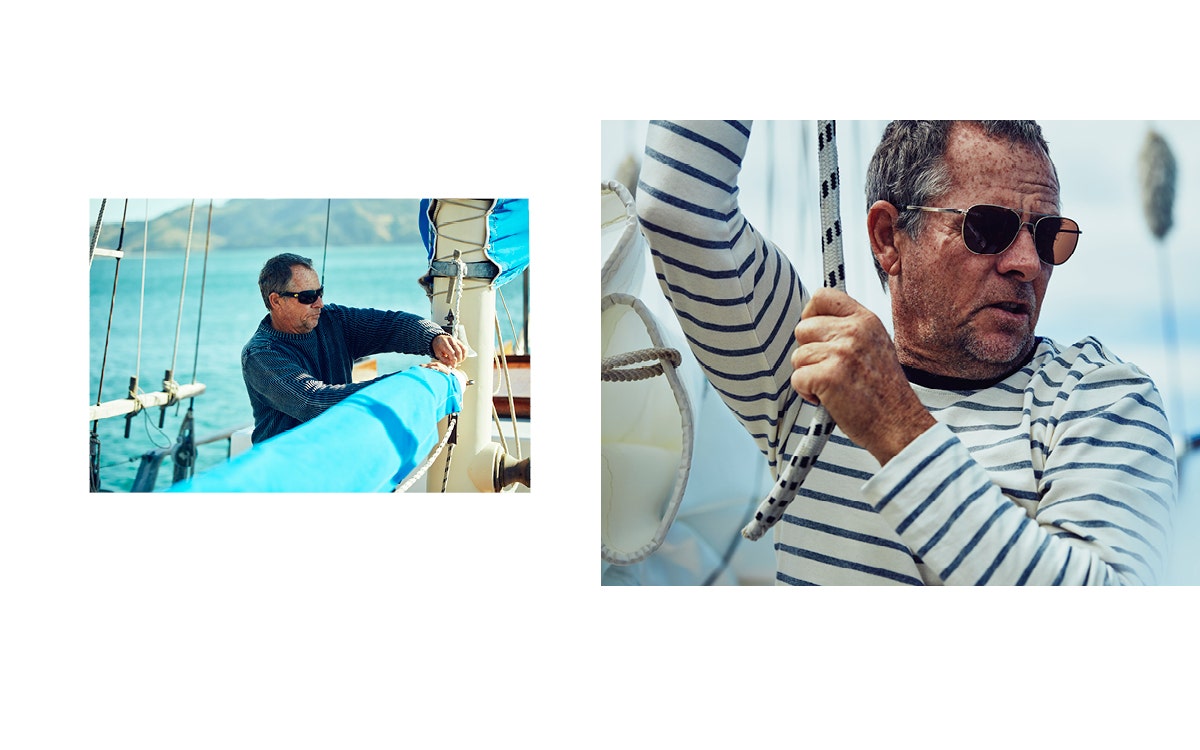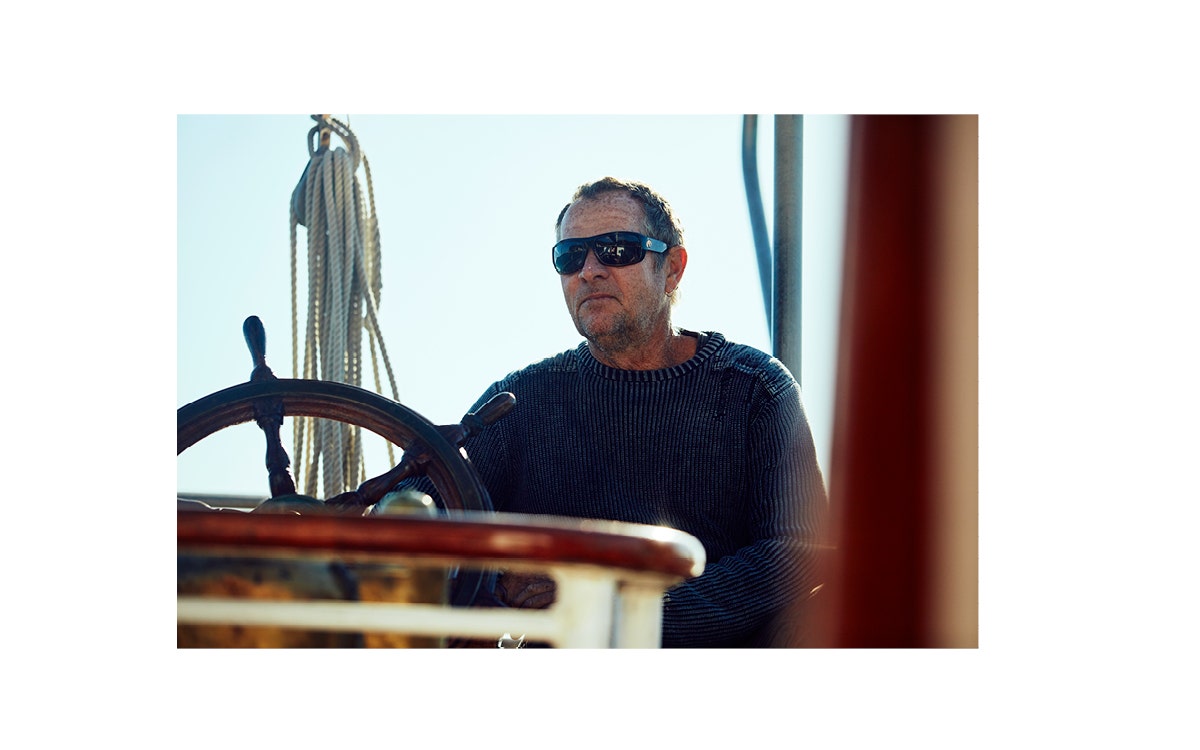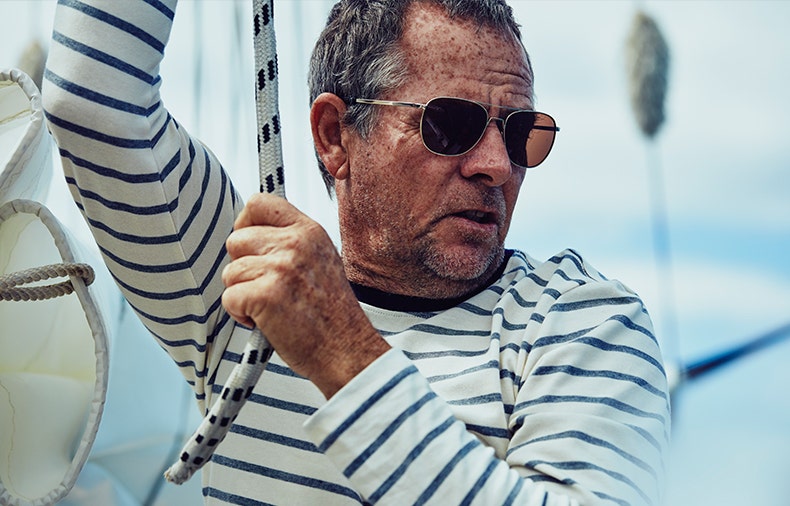Avon Hansford is a sailor, an adventurer, a raconteur, and the owner of the schooner Barkers shot our Summer 17/18 campaign on Anchorage off the coast of the Coromandel. So, to find out more, we sent land-loving Don Rowe to ask Avon about his boat Windborne and life on the high seas.
Tell me a bit about this boat. I couldn’t even pronounce ‘schooner’ until yesterday...
It’s a 1928 Topsail Schooner, and it was designed for racing in the Fastnet Race in particular. The Second World War came along and a lot of boat owners didn’t like the idea of the nasty Germans shooting at their boats, so, because a lot of them were taken by the admiralty for coastal patrol work, they hid them. This boat was launched as a boat called Magnet, and then it was hidden somewhere.
Nobody seems to know what happened to her until she turned up in Vancouver in 1960 under the name of Hugenouet. Then she sailed to New Zealand in 1980 under the name of Windborne and it had a pretty major restoration down in the South Island by a very good boat builder called John Gander. I bought her around the millenium and have just been sailing out of Whitianga as a charter boat since then.
I’ve undertaken since then a massive restoration with re-fastening the entire hull with bronze, moving all the hand beaten iron dumps that held it together and putting a new bow in and just endless, endless amounts of work. But considering that the boats drawing towards 100 years old, for her still to be making a living sailing, and then when we’re not doing major work on her in the winter, sailing up to islands and having a lot of fun and adventure up in the tropics is something special to be said for a boat of this age.

So when you use this boat recreationally, what sort of conditions can you take on? It’s a long way from Vancouver to the South Island.
The boat weighs 35 tonne and I sail it on my own, which, to look at me, you’d think ‘what’s a weakling old man like that sailing a boat of that size?’ But it’s no real skill on my part, it’s more that she’s just beautifully balanced. She’s got eight sails, and all I have to do is trim them properly and she sails herself, so yes we can sail through 50 knots of weather, and then she can also move along quite nicely in light winds.
It’ll never get up on the foils, but it’s a wonderfully versatile boat. We have a wood stove on board and up until last night we’ve had the thing going every night to warm the boat up, get through any condensation problems on the boat.
Do you live on the boat full time?
I do, yes. That’s our full-time home, my better-half and I. We’re allergic to lawnmowers. At the moment, we’ve got about ten days off between work and so we’ve just sailed up here to the Bay of Islands. We were going to try and get into Auckland but the wind was right on the nose so we went the other way. I’ve just been out here making sure the oysters are nice and fat on the rocks at Smokehouse Bay.
Sounds horrible. Wouldn’t you much rather be stuck in an apartment in the CBD?
I would really love it. There’s something so meditative about traffic.
So were the kids raised on the boat?
I’ve been a sailor all my life and the kids were all raised on the boat. They were all waterborne kids. My oldest son Julian is an eight-time New Zealand spearfishing champion now and he’s very, very good underwater. He’s been teaching big wave surfers about breath-holding and how to calm yourself before you swim down to incredible depths and stay there for long periods of time. That came from being raised on boats and being taught by his old man. My other son is a sailing instructor in the navy and so we’ve all been mucking around the water our entire lives.
It’s funny you mention that sitting in traffic is meditative, because in reality the real meditative process is breath control. Is there some sort of yogic connection there? Some philosophical bones to the thing?
I’m not sure about that but what happened was when he was very young, four or five years old, he would hop on my back and come down with me and then let go when it got too deep for him, and return to the surface. He had really bad asthma when he was a kid and so, without being instructed by anyone, he used to teach himself to slow his heart rate down, jump into the water holding a large rock, and see how long he could stay under for. From that he cured his asthma by breath control. He cured himself, and he made a living out of diving. For a long time he was diving for paua in the south pacific, in Australia he dove for abalone in amongst the great whites, and he was a tuna cowboy for a while, but as we age these things obviously become harder and harder to do.
What does growing up around the ocean lend to a mind?
It’s definitely a spiritual experience, the ocean. It teaches you patience. Sailing teaches you patience and to relax. Once you don’t fear the ocean then you can look at it for what it is, it’s a hugely abundant source of nutrition and adventure. Treated with respect it can be very, very calming, and sometimes very frightening. But it gives you a sense of balance, how finely balanced everything on the planet is.
It keeps you young too. You’re always adventuring, you can up anchor and move anywhere you like, and in the process it’s quite physical if you have an old boat like this where everything is manual. It keeps you going.


